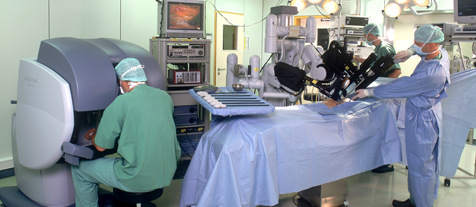According to data submitted by researchers from Johns Hopkins University School of Medicine, patients who receive an elaborate robotic colon surgery are likely to experience the same success rate as those who undergo a minimally invasive laparoscopic surgery, however are subjected to paying a much heavier bill.
These recent findings have proffered a counter argument over the seemingly aggressive advertising some hospitals have applied in promoting the features and advantages of this new, expensive technology even before proper research was conducted to find out whether robotic surgery is actually more beneficial to patients.
"The true test of something new in medicine should be: Is it better? Is it safer? Does it save money? If not, then we probably shouldn't be using it. What we have found is that the robot is no better than laparoscopy and it costs more. It has no benefit," said associate professor of surgery and oncology at the Johns Hopkins University School of Medicine and leader of the study, Nita Ahuja, M.D.
The study has since gone on to be published online in the journal, JAMA Surgery.
Using the U.S. Nationwide Inpatient Sample database, Ahuja and her team analyzed data from 244,129 colectomies (surgery to remove part or all of the colon) between October 2008 and December 2010 performed at hospitals across the country. Based on data from the colectomies, the team found comparable complication rates, mortality rates, and length of hospital stays between laparoscopic surgery and robotic surgery. However, the robotic surgery cost an average of nearly $3,000 more ($14,847 vs. $11,966) than laparoscopic surgery.
Additionally, the study also compared results of open surgery. Open surgery was performed on 51.7 percent of patients, laparoscopy on 47.6 percent and robotic surgery in just 0.7 percent of cases. The study also found laparoscopy was linked with a lower mortality rate, complication rate, shorter hospital stays, and lower costs than open surgery.
Robotic surgery is performed by a surgeon who controls instruments inside the body via computer, usually from a room adjacent to the patient. Surgeons lose some of the physical feel they use to make certain judgments, but many say they gain a larger range of motion, as robotic arms and "hands" can do things that human arms and hands cannot. It is also easier to learn robotic surgery, notes Ahuja, who herself is a colorectal surgeon.
"The researchers say there may be some bias in who is chosen for which type of surgery; healthier and younger patients may be getting laparoscopic and robotic surgery, skewing the results somewhat. A randomized, controlled clinical trial comparing approaches head to head would be the best way to determine which one is truly the best," she said.
In the meantime, the surgical robot is growing in popularity for colon surgery, even though there is no concrete evidence that proves that it is in fact better and despite the new evidence showing that it is more expensive.
If the robot proved to have better advantages and benefits than basic colon surgery, then Ahuja would deem it a credible resource despite its steep price.
"Just because something sounds like it's good doesn't mean it is. We need to keep studying it before it becomes the standard of care without the supporting evidence," Ahuja concludes.
